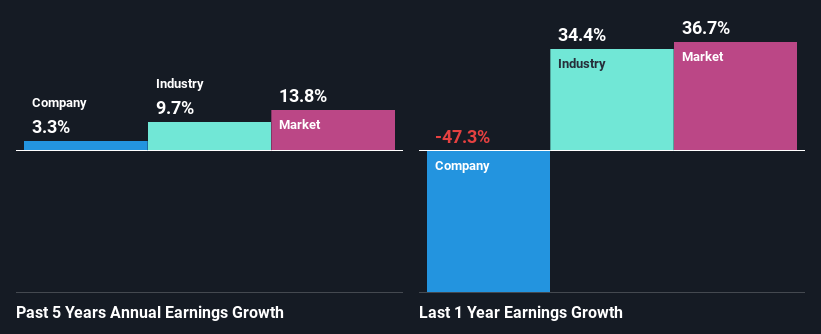Are RBC Bearings Incorporated's (NASDAQ:ROLL) Mixed Financials Driving The Negative Sentiment?
With its stock down 12% over the past month, it is easy to disregard RBC Bearings (NASDAQ:ROLL). We, however decided to study the company's financials to determine if they have got anything to do with the price decline. Long-term fundamentals are usually what drive market outcomes, so it's worth paying close attention. Particularly, we will be paying attention to RBC Bearings' ROE today.
Return on equity or ROE is a key measure used to assess how efficiently a company's management is utilizing the company's capital. Simply put, it is used to assess the profitability of a company in relation to its equity capital.
See our latest analysis for RBC Bearings
How Do You Calculate Return On Equity?
The formula for return on equity is:
Return on Equity = Net Profit (from continuing operations) ÷ Shareholders' Equity
So, based on the above formula, the ROE for RBC Bearings is:
2.5% = US$58m ÷ US$2.3b (Based on the trailing twelve months to January 2022).
The 'return' is the income the business earned over the last year. So, this means that for every $1 of its shareholder's investments, the company generates a profit of $0.02.
Why Is ROE Important For Earnings Growth?
Thus far, we have learned that ROE measures how efficiently a company is generating its profits. Depending on how much of these profits the company reinvests or "retains", and how effectively it does so, we are then able to assess a company’s earnings growth potential. Generally speaking, other things being equal, firms with a high return on equity and profit retention, have a higher growth rate than firms that don’t share these attributes.
A Side By Side comparison of RBC Bearings' Earnings Growth And 2.5% ROE
As you can see, RBC Bearings' ROE looks pretty weak. Even compared to the average industry ROE of 13%, the company's ROE is quite dismal. Thus, the low net income growth of 3.3% seen by RBC Bearings over the past five years could probably be the result of it having a lower ROE.
We then compared RBC Bearings' net income growth with the industry and found that the company's growth figure is lower than the average industry growth rate of 9.7% in the same period, which is a bit concerning.
The basis for attaching value to a company is, to a great extent, tied to its earnings growth. The investor should try to establish if the expected growth or decline in earnings, whichever the case may be, is priced in. Doing so will help them establish if the stock's future looks promising or ominous. Is ROLL fairly valued? This infographic on the company's intrinsic value has everything you need to know.
Is RBC Bearings Efficiently Re-investing Its Profits?
RBC Bearings doesn't pay any dividend, which means that it is retaining all of its earnings. However, there's only been very little earnings growth to show for it. So there might be other factors at play here which could potentially be hampering growth. For example, the business has faced some headwinds.
Summary
In total, we're a bit ambivalent about RBC Bearings' performance. Even though it appears to be retaining most of its profits, given the low ROE, investors may not be benefitting from all that reinvestment after all. The low earnings growth suggests our theory correct. Having said that, looking at the current analyst estimates, we found that the company's earnings are expected to gain momentum. To know more about the latest analysts predictions for the company, check out this visualization of analyst forecasts for the company.
Have feedback on this article? Concerned about the content? Get in touch with us directly. Alternatively, email editorial-team (at) simplywallst.com.
This article by Simply Wall St is general in nature. We provide commentary based on historical data and analyst forecasts only using an unbiased methodology and our articles are not intended to be financial advice. It does not constitute a recommendation to buy or sell any stock, and does not take account of your objectives, or your financial situation. We aim to bring you long-term focused analysis driven by fundamental data. Note that our analysis may not factor in the latest price-sensitive company announcements or qualitative material. Simply Wall St has no position in any stocks mentioned.

